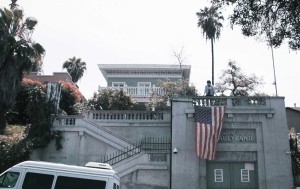
Cinematographers Shane Bruce Johnston and Charles Gibson recently relied on Blackmagic’s Pocket Cinema Camera and Cinema Camera EF to shoot the Sundance film The 4th. The film, from writer/director Andre Hyland, is a comedy that tells the story of a slacker named Jamie who tries to make his way through the Fourth of July while dealing with chain of bad luck and escalating situations. It’s the first full length film by Hyland, who won Sundance acclaim for his 2014 short film Funnel. Also starring Hyland, the film explores how a chance encounter can completely change a day’s course of events through the lens of a slacker comedy.
For Johnston and Gibson, the film’s improvisational humor and run-and-gun style called for a two camera approach. With the cameras, the DPs were able to easily shoot on the go using handheld rigs.
“When we were evaluating gear for the film, it was crucially important that we selected cameras that could produce cinematic images while also being compact enough for guerrilla style shooting,” said Johnston. “With the Blackmagic Design cameras, we achieved our goal of producing an indie film with cinematic moments.”
With Jamie’s journey taking him throughout Los Angeles, the film was shot in a variety of locations, including dark streets and packed cars. The Blackmagic Design cameras allowed Johnston and Gibson to capture the shots they needed, even when they didn’t have a lot of light or were in cramped quarters.
“Both of the cameras worked very well in low light, so we didn’t need to worry about a lighting setup,” said Gibson. “This was especially helpful when we were on sidewalks just working under the streetlights.”
“The Pocket Cinema Camera’s size also came in handy during shoots in the car,” said Johnston. “Even when there were four actors packed in we were able to use the camera’s flexibility to our advantage and get the shots we needed. For the film’s establishing shot, I was perched about 40 feet up in the air and had to capture a long sequence of Hyland walking toward me from down the street. The shot was a continuous take for more than five minutes and there is no way I could have pulled it off with a bulkier camera.”
The film was color graded by Mark Todd Osborne at MTO ColorData using DaVinci Resolve 12 Studio.
“The 4th was shot in a relatively short period of time so the challenge was to keep all of the scenes balanced and natural looking,” said Osborne. “It’s a slice of life piece so it just needed strong, rich colors and nice skin tones. With DaVinci Resolve 12 Studio, I was able to accomplish the needed balance and look that the film called for.”





